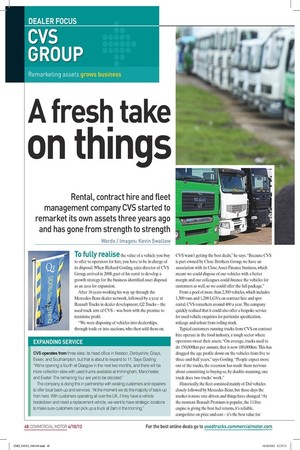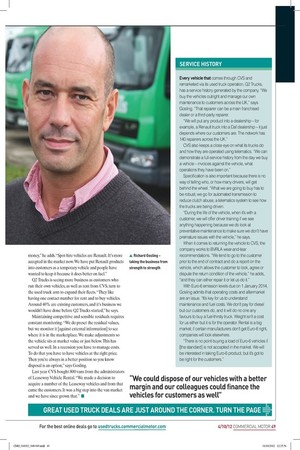A fresh take
Page 39

Page 40

If you've noticed an error in this article please click here to report it so we can fix it.
on things
Rental, contract hire and fleet management company CVS started to remarket its own assets three years ago and has gone from strength to strength
Words / Images: Kevin Swallow
To fully realise the value of a vehicle you buy to offer to operators for hire, you have to be in charge of its disposal. When Richard Gosling, sales director of CVS Group, arrived in 2008, part of his remit to develop a growth strategy for the business identified asset disposal as an area for expansion.
After 16 years working his way up through the Mercedes-Benz dealer network, followed by a year at Renault Trucks in dealer development, Q2 Trucks – the used truck arm of CVS – was born with the premise to maximise profit.
“We were disposing of vehicles into dealerships, through trade or into auctions, who then sold them on. CVS wasn’t getting the best deals,” he says. “Because CVS is part-owned by Close Brothers Group, we have an association with its Close Asset Finance business, which meant we could dispose of our vehicles with a better margin and our colleagues could finance the vehicles for customers as well, so we could offer the full package.” From a pool of more than 2,500 vehicles, which includes 1,300 vans and 1,200 LGVs, on contract hire and spot rental, CVS remarkets around 400 a year. The company quickly realised that it could also offer a bespoke service for used vehicle enquiries for particular specification, mileage and colour from rolling stock.
Typical customers running trucks from CVS on contract hire operate in the food industry, a tough sector where operators sweat their assets. “On average, trucks used to do 150,000km per annum, that is now 180,000km. This has dragged the age profile down on the vehicles from five to three-and-half years,” says Gosling. “People expect more out of the trucks, the recession has made them nervous about committing to buying so, by double-manning, one truck does two trucks’ work.” Historically, the fleet consisted mainly of Daf vehicles closely followed by Mercedes-Benz, but these days the market is more rate-driven and things have changed. “At the moment Renault Premium is popular, the 11-litre engine is giving the best fuel returns, it’s reliable, competitive on price and cost – it’s the best value for money,” he adds. “Spot-hire vehicles are Renault. It’s more accepted in the market now. We have put Renault products into customers as a temporary vehicle and people have wanted to keep it because it does better on fuel.” Q2 Trucks is seeing more business as customers who run their own vehicles, as well as rent from CVS, turn to the used truck arm to expand their fleets. “They like having one contact number for rent and to buy vehicles. Around 40% are existing customers, and it’s business we wouldn’t have done before Q2 Trucks started,” he says.
Maintaining competitive and sensible residuals requires constant monitoring. “We do preset the residual values, but we monitor it [against external information] to see where it is in the marketplace. We make adjustments so the vehicle sits at market value or just below. This has served us well. In a recession you have to manage costs. To do that you have to have vehicles at the right price. Then you’re always in a better position so you know disposal is an option,” says Gosling.
Last year CVS bought 800 vans from the administrators of Leaseway Vehicle Rental. “We made a decision to acquire a number of the Leaseway vehicles and from that came the customers. It was a big step into the van market and we have since grown that.” n










































